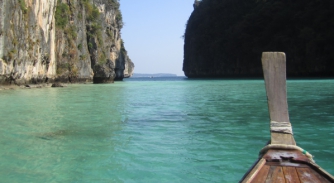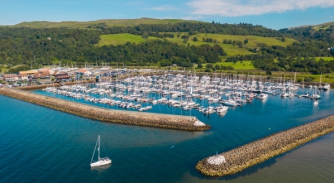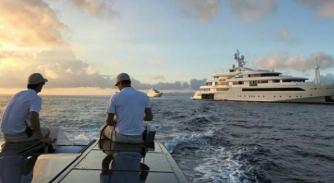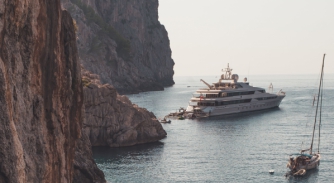Yacht owners push for nuclear power
More owners are pushing for nuclear power on board, some by the end of the decade, according to a recent Lloyd’s Register report…

Nuclear propulsion is rapidly emerging as a viable power source for yachting, providing both commercial and operational advantages alongside emissions-free sailing according to a new report from Lloyd’s Register (LR). Fuel for Thought: Nuclear for Yachts, the latest report in LR’s alternative fuel series, explores how this technology could revolutionise yachting, offering unprecedented advancements in sustainability and performance.
The report dissects the potential of nuclear reactors for the industry. These reactors promise to deliver higher power outputs, longer range, increased speeds and superior performance, all of which could transform the sector in much the same way as the transition from sail to steam did in previous eras.
Engel-Jan de Boer, Global Yacht Segment Director at Lloyd’s Register, sees enormous potential for nuclear propulsion. “Nuclear energy offers the potential to be as transformational to shipping as the shift from wood to iron or from sail to steam,” he says. “Unlike alternative fuels that might serve as direct replacements for traditional oil-fired systems, nuclear power represents a fundamental shift that could redefine yachting.”
According to the report, yacht owners interested in nuclear power are generally divided into two groups: those seeking to deploy nuclear-powered yachts with existing technologies by the end of the decade and those planning for a longer-term timeline of about 20 years when a broader range of advanced technologies will be available.
Although nuclear propulsion is new to yachting, it has over 70 years of successful deployment in naval vessels and Russian icebreakers. According to LR, “nuclear propulsion has been used for seven decades by navies and a few state-owned cargo ships and icebreakers, with an unparalleled safety record.” This track record, coupled with advances in Small Modular Reactors (SMRs) and micro-reactors, makes nuclear propulsion increasingly attractive for wider use in commercial shipping and yachts.
As per LR, SMRs and micro-reactors, specifically designed for safety, efficiency and modularity, are well-suited for yachting. These reactors could operate for extended periods without needing to refuel, eliminating the need for bunkering and enabling operational flexibility at an unprecedented degree.
And while nuclear propulsion requires a sizeable upfront investment, LR claims that the long-term cost savings could be huge. The efficiency and longevity of nuclear fuel could slash operational expenses, especially considering the claim that it can power vessels for years (or even decades).
For example, Russian nuclear icebreakers are refuelled every five to seven years, while some submarines have reactors designed to last their entire 30-to-35-year lifespan without refuelling. Unlike traditional fuel bunkering, which is handled by the crew, nuclear refuelling requires specialists and may involve topping up fuel, replacing it, or swapping the reactor entirely. Refuelling experience is mostly limited to military vessels, where it often coincides with mid-life upgrades.
In yachting terms, although the upfront cost of nuclear fuel is higher than conventional fuels, it becomes cost-competitive over time due to its long operational lifespan. Yacht owners are expected to lease reactors and contract for energy output rather than purchase the fuel, treating it as a capital expense. The key operational cost will be the agreed price per megawatt-hour (MWh), not the refuelling itself.
Other advantages detailed in the report allude to higher speeds and better overall performance due to the energy density of uranium, which is considerably greater than that of traditional diesel. Moreover, nuclear reactors are space-efficient, allowing more room on board for other amenities.
From an environmental perspective, the technology produces zero greenhouse gas emissions at the point of use, making it a far cleaner alternative to traditional fossil fuels. Nuclear energy provides stable and reliable power without the environmental footprint associated with fuels like hydrogen, making it a compelling solution as the industry faces increasing pressure to decarbonise.
According to the report, floating nuclear power plants could also be established to produce synthetic fuels using only seawater and air, further supporting decarbonisation efforts.
However, there are still significant challenges to be addressed before nuclear-powered yachts become a mainstream concept, and for good reason. The association of nuclear energy with accidents like Chernobyl and Fukushima continues to shape public opinion, so safety concerns and public perception remain major hurdles.
But LR highlights that modern nuclear designs are far safer, incorporating “passive safety features” that make them fail-safe even in the event of malfunction. For instance, Molten Salt Reactors (MSRs) feature passive cooling systems that automatically activate in case of overheating, reducing the likelihood of accidents.
Regulatory frameworks must also evolve to support the adoption of nuclear propulsion for the nuclear vision to be realised. Existing regulations, such as those in SOLAS Chapter VIII and the IMO’s Code of Safety for Nuclear Merchant Ships, are outdated and need revision to accommodate modern reactor technology. LR suggests that furthered collaboration between the IMO and the International Atomic Energy Agency (IAEA) will be vital in developing the necessary regulatory standards for the safe operation of nuclear-powered vessels.
“While significant challenges remain, the potential benefits of extended range, high power output, environmental sustainability, and technological prestige make nuclear-powered yachts an intriguing and possibly transformative prospect for the industry,” adds De Boer. “As research and development in nuclear science progresses, the maritime industry may very well enter a new era where yachts are powered by the boundless energy of the atom.”
The full report can be accessed via the Lloyd’s Register website.
Profile links
NEW: Sign up for SuperyachtNewsweek!
Get the latest weekly news, in-depth reports, intelligence, and strategic insights, delivered directly from The Superyacht Group's editors and market analysts.
Stay at the forefront of the superyacht industry with SuperyachtNewsweek
Click here to become part of The Superyacht Group community, and join us in our mission to make this industry accessible to all, and prosperous for the long-term. We are offering access to the superyacht industry’s most comprehensive and longstanding archive of business-critical information, as well as a comprehensive, real-time superyacht fleet database, for just £10 per month, because we are One Industry with One Mission. Sign up here.
Related news

Thailand makes changes to charter
Thailand plans to boost superyacht tourism by revising charter laws, redefining yacht size and insurance policies to align with international standards
Crew

Nuclear-powered yachts: a viable option towards achieving net-zero emissions?
Imagine a very large yacht capable of cruising the world non-stop without refuelling or requiring an expensive chase boat. Could this become a reality?
Crew
.jpg)
The Superyacht Report - Captains Focus: Read It Now!
Issue 221: The Superyacht Report - Captains Focus is now available to read and download online
Crew

British maritime industry surges in growth
The maritime sector in the UK is flourishing, with double-digit growth and increased contributions to the economy, according to a British Marine report
Business

Are crew lacking leadership?
Despite some efforts being made to improve mental health on board, little has changed. Can senior leaders do more to truly turn the tide?
Crew

Stricter entry requirements for crew in Mallorca
In a significant policy shift, Mallorcan authorities have introduced a new mandate altering the entry criteria for non-EU crew
Crew
Related news
Thailand makes changes to charter
1 year ago
British maritime industry surges in growth
2 years ago
Are crew lacking leadership?
2 years ago
Stricter entry requirements for crew in Mallorca
2 years ago
NEW: Sign up for
SuperyachtNewsweek!
Get the latest weekly news, in-depth reports, intelligence, and strategic insights, delivered directly from The Superyacht Group's editors and market analysts.
Stay at the forefront of the superyacht industry with SuperyachtNewsweek



